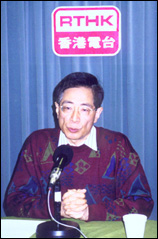 |
|
RTHK "Letter to Hong Kong" by Martin Lee Broadcast on RTHK Radio 3 on 26 July 1998 The first year of Hong Kong under Chinese rule has not gone on too well. I think a lot of people will agree. Basically, a lot of people are not happy with the way this government is run. But what should the relationship be between the executive and the legislature is an important question. That question was answered in both the Sino-British Joint Declaration and the Basic Law - both documents which say very clearly that the executive authorities must be accountable to the legislature. Well, recently we've had elections in Hong Kong and so we now have an elected legislature. Of course only one-third of the seats are by way of democratic elections and the rest are not that democratically elected. But however you look at it, the legislature is the most representative institution in Hong Kong. The Chief Executive, on the other hand, was only chosen by 400 people - all of whom were actually handpicked by China. So the legislature has the mandate of the people, but not the Chief Executive and his government officials. There have been a number of recent events which cause us even more concern and anxiety about the relationship between the Chief Executive and the legislature. First there was a letter dated June 30, 1998 written by the Solicitor General Mr. Daniel Fung, Senior Counsel, to the legal adviser of the Legislative Council Secretariat, pointing out that in four separate ways, the standing orders recently amended by the legislature relating to the order of speeches and business in the Legislative Council were against the Basic Law. Mr Fung ended the letter by requesting the Legislative Council to make the necessary amendments to these standing orders in order to make sure the finished product would comply with the Basic Law. I have to say that if Mr. Fung were to have his way on all four of these proposals, the legislature would be an absolute rubber stamp. For example, Article 74 of the Basic Law already makes it impossible for a legislator to introduce a private member's bills relating to public expenditure, political structure or the operation of the government. And legislators may not present any bills relating to government policies without the prior written consent of the Chief Executive. Mr. Fung would like the Standing Orders to be so drafted so that even amendments to bills presented by the government covering these issues be regulated similarly by Article 74. Which means, if the government were to introduce a bill relating to government policies then no member can amend the bill in any way without the prior written consent of the Chief Executive. If the Chief Executive likes the amendment he will allow it, but he doesn't like it, he will not give his written consent and that amendment cannot be proposed. I'm glad that the legislators had no trouble in refusing to accept these proposals from Mr. Fung. But the question is, why did Mr. Fung write such a letter? Did he write it out of his own mind? In which case, I'm really sorry for the quality of his opinion. But did he write it because he was instructed by his boss the Chief Executive to write it? Did the Chief Executive instruct him to write the letter because the Chief Executive himself thought there was an improper construction of the standing order and Basic Law? Or was he actually told by the Chinese leaders in Beijing to do so. Whichever way you look at it, it cannot be good for legislature. It is obvious the government wishes to reduce the legislature into an absolute rubber stamp. It is therefore particularly unfortunate that the Legislative Council did not support the motion from my party which called for more democracy to be given to Hong Kong so that by the year 2000 all 60 legislators would be elected democratically and by the year 2002 our next Chief Executive would also be democratically elected by the people of Hong Kong. A number of pretexts were put forward by various legislatures as to why we should wait. In short, some would say: "we are not ready so give us more time." Other would say, you cannot just bring in democracy like that without figuring out first the proper relationship of the executive and legislature. Some have suggested a ministerial system. Of course I support it too. But should we allow considerations of this kind to delay the introduction of democracy to our system? Surely we still have two years to go about it. Surely we could iron out whatever differences there may be - whether we should have a ministerial system or some other system - during these two years. Two years is a long time in politics and lot can be done in two years if people really want to do it. That is why that it should not have been a good reason for legislators to agree to delay the introduction of democracy to Hong Kong. Surely the message from the people of Hong Kong themselves is as clear as can be. On the 24th of May when there were torrential rains people voted in huge numbers. The voter turnout was more than 50% -- higher than that for 1995. The message is loud and clear - the people of Hong Kong want and deserve democracy. And we legislators and the government would be failing in our duties if we do not use our best endeavours to bring about democracy to Hong Kong. The time is now. |
|
